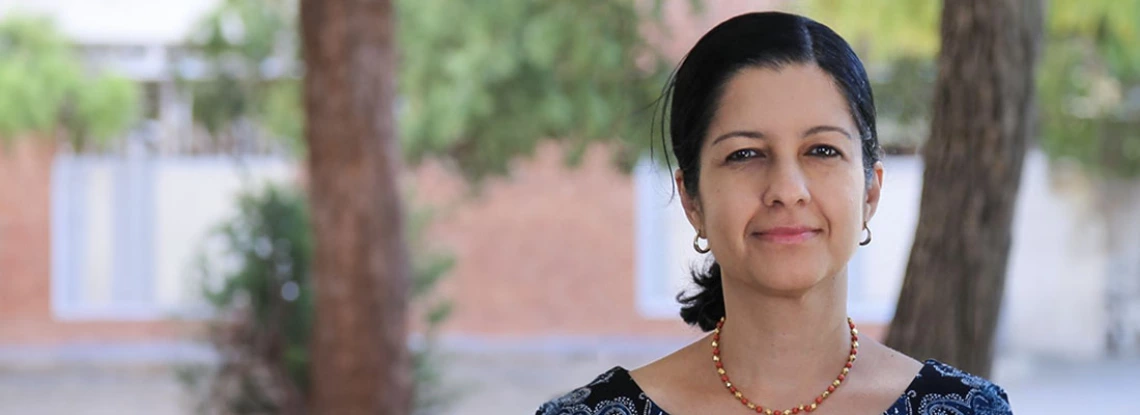Women of Impact: Gayatri Vedantam

Gayatri Vedantam, a Professor in the School of Animal and Comparative Biomedical Sciences, has been honored with a Women of Impact Award by the University of Arizona Office of Research, Innovation & Impact.
Gayatri Vedantam’s story is worthy of a Netflix detective series, or a lost Sherlock Holmes adventure: A tenacious, brainy detective and a shapeshifting, deadly adversary locked in a chase across two decades and multiple continents.
Vedantam, a Professor in the School of Animal and Comparative Biomedical Sciences and a U.S. Department of Veterans Affairs Research Career Scientist, has spent her entire professional career working to prevent and treat gastrointestinal infections. For the past 15 years at the University of Arizona, she and her research team have focused on Clostridioides difficile, a deadly bacterium that causes healthcare-associated infections.
“Difficile is the Latin word for difficult, and that’s how it got its name,” Gayatri said of her longtime nemesis. “We call it ‘the shape-shifting bacterium’ because it changes form when you’re trying to attack it with antibiotics or disinfectants. It’s a truly difficult pathogen that preys on weakness—patients in the hospital, those on antibiotics or chemotherapy, and the elderly – they’re all at risk.”
Vedantam began hunting C. difficile at Loyola University Medical Center and the Hines VA Hospital near Chicago in the early 2000s and continued the quest after she joined the University of Arizona in 2008. Like a tense detective movie, Vedantam’s pursuit of C. difficile has included close calls and narrow escapes.
“We’ve had a lot of moments of, ‘Oh, my gosh, we were so close, but this thing is way smarter than us,” Gayatri said. “It’s a lot of, a half-step forward and five steps back. But it’s good to be working with pathogens like this because it keeps you humble.”
Vedantam said her research spans the “bedside-to-bench-to-bedside” spectrum, meaning she’s not just sitting at a microscope in a lab all day; just the opposite. Because of her dual appointments as a federal research scientist and UA faculty member, she interacts regularly with patients, clinicians, scientists and stakeholders.
Although C. difficile has lived up to its reputation for being elusive, Vedantam and her laboratory team have had plenty of success, too. Working with UA Tech Launch, Vedantam has developed preventives and therapies for C. difficile, and has multiple products that are currently in pre-clinical development. She’s looking forward to getting these medicines into clinical trials and provided to patients as soon as possible.
“We’ve made some strides, and we still have a long way to go,” she said. “Our progress makes me reflect on the patients I encounter and the people who have been ravaged by this disease. That’s what makes me get up in the morning. I know how much damage this one pathogen has caused. The day I get put out of work because we’ve solved the C. difficile problem will be the happiest day of my life.”
While Vedantam’s fight against C. difficile has been about the long game, she and her ACBS Professor colleague VK Viswanathan pivoted into a different high-speed mode early in the COVID-19 pandemic when they saw an opportunity to help.
They converted laboratory space into a medical-grade hand-sanitizer production center and distributed the product along with gloves and masks to Southern Arizona healthcare facilities, foodbanks, Tribal Nations, and across the UA including UAPD, Campus Health and vaccination pods. Through the effort, and despite continuing on with their C. difficile research, they and their team members produced enough sanitizer to fill 40,000 bottles.
“Our sanitizer project grew out of an intense desire to connect with our community in a tangible fashion,” Gayatri said. “We quickly realized there was a need, with stores running out of hand sanitizer, and as microbiologists, we knew that that was something we could make, and make really well.”
Vedantam said her mission to help people lead healthier lives was sparked by her own life story. Her grandmother was the only one of the few survivors of the Bubonic Plague when it broke out in Southern India in the early 1900s.
“I’m here today because my grandma did not die of the plague,” said Gayatri, who currently teaches bacteriology and infectious diseases classes at the College of Medicine-Tucson. “I grew up hearing her stories, as well as those of how infectious diseases shaped the histories of her children. So, my grandmother and mother are women of impact in my life.”
Vedantam, who earned CALES Teaching Faculty of the Year recognition in 2011 and Research Faculty of the Year in 2013 and 2018, said she is “honored and grateful” to be part of the 2023 Women of Impact, an awards program sponsored by the UA Office of Research, Innovation, Impact. “For me, this award also acknowledges all the people in our team who make our research possible,” Gayatri said. “It’s a team award.”
